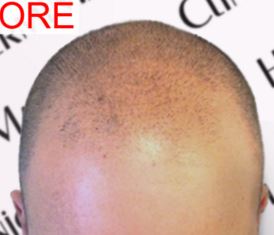In recent years, the use of essential oils for hair growth has gained significant attention. Traditional hair loss treatments often involve pharmaceuticals or surgical interventions, leading many to explore natural remedies like essential oils for their potential benefits.
This article delves into the science behind essential oils and explores their role in hair growth, backed by scientific evidence, and concludes with a brief discussion on scalp micropigmentation as a permanent hair loss solution.
Essential Oils: Nature’s Concentrated Powerhouses
Essential oils are highly concentrated plant extracts that capture the volatile compounds responsible for a plant’s aroma and therapeutic properties. Several essential oils have been studied for their potential to stimulate hair growth, improve scalp health, and reduce hair loss.
While research on essential oils for hair growth is ongoing, some oils show promise:
Lavender Oil
A 2016 study published in Toxicological Research investigated the effect of topical lavender oil application on shaved mice. The results were encouraging, with mice treated with lavender oil experiencing faster hair growth and an increased number of hair follicles compared to the control group. Researchers attributed this effect to lavender oil’s ability to promote cell growth and potentially reduce stress, a known contributor to hair loss.
Peppermint Oil
A 2014 study compared peppermint oil to minoxidil, a common hair loss medication. It found that peppermint oil application on mice resulted in a more significant increase in the number of hair follicles, follicle depth, and overall hair growth compared to minoxidil.
Researchers suggest that peppermint oil helps improve blood flow, which might contribute to improved scalp health. Proponents of this theory relate this fact with its hair growth-promoting effects. They explain that peppermint helps deliver essential nutrients to hair follicles.
Rosemary Oil
Another essential oil for hair growth, rosemary oil is believed to have a similar effect on hair loss as minoxidil.
A 2015 study published in Skinmed Journal compared the effectiveness of rosemary oil to minoxidil in individuals with androgenetic alopecia. After six months, both groups experienced significant hair growth, with no significant difference between the rosemary oil and minoxidil treatments.
Tea Tree Oil
Tea tree oil possesses antimicrobial properties that can contribute to a healthy scalp environment. A study published in the Journal of Dermatological Treatment found that a combination of tea tree oil and minoxidil was more effective in treating dandruff, a condition that can contribute to hair loss, compared to minoxidil alone.
Important Considerations for Use of Essential Oil for Hair Growth
While these studies are promising, it’s crucial to note some key points:
Limited research
Most research has been conducted on animals. More extensive clinical studies can help understand the efficacy of essential oils for hair growth in humans.
Safe Use
Essential oils are potent and must be diluted with a carrier oil like coconut or jojoba oil before applying them to the scalp to avoid irritation. Always conduct a patch test on your inner arm before full application to check for allergies.
Focus on Scalp Health
Maintaining a healthy scalp with a balanced diet, proper hygiene, and managing stress levels is vital for optimal hair growth.
Beyond Essential Oils
For individuals experiencing hair loss, essential oils are a complementary approach. They may or may not work. Besides, you cannot expect to see overnight results and may have to wait for months or years for these natural remedies to show effect.
Scalp Micropigmentation: A Permanent Hair Loss Solution
For those seeking a more permanent solution for hair loss, scalp micropigmentation has emerged as a viable option. This cosmetic procedure involves using microneedles to deposit tiny pigment dots on the scalp, creating the illusion of a shaved head or denser hair. While SMP doesn’t stimulate hair growth, it offers a visually appealing and long-lasting solution for individuals with significant hair loss.
Essential oils may hold some promise for promoting hair growth, with rosemary oil showing the most compelling evidence in research. However, more studies are necessary to solidify their effectiveness.
Ultimately, for those seeking a permanent solution, scalp micropigmentation may offer a more definitive approach. Choose a well-trained and skilled scalp practitioner in Arizona for the job to deliver the best SMP results for you.
Get help at DermiMatch Clinic, where experienced Arizona SMP artists have helped thousands of clients overcome the misery of hair loss.
What are you waiting for?


